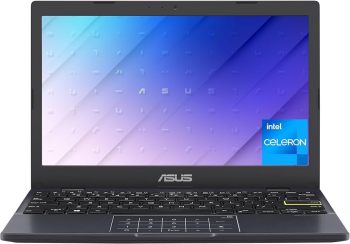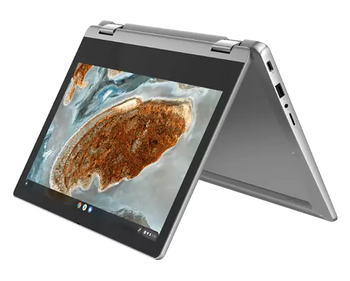- Highly portable
- Affordable price
- Decent performance for everyday tasks
- Flexible 360-degree hinge
- Good battery life
- Access to Google Play Store
- Limited storage space
- Not suitable for heavy multitasking
- Limited offline functionality
- Performance may lag with demanding applications
ASUS L210 Ultra-Thin Laptop vs Lenovo Chromebook Flex 3
When it comes to affordable and portable computing, two options that stand out are the ASUS L210 Ultra-Thin Laptop and the Lenovo Chromebook Flex 3. Both devices cater to users seeking compact, lightweight solutions for everyday tasks, reminiscent of the classic netbook laptops that were popular in the late 2000s and early 2010s.
The ASUS L210 Ultra-Thin Laptop is a Windows-based device that measures just 0.67 inches thick and weighs a mere 2.31 pounds, making it an excellent choice for those who need a laptop that can easily slip into a backpack or purse. It features an 11.6-inch LED-backlit display with a resolution of 1366x768 pixels, which provides clear and vibrant visuals. The device is powered by an Intel Celeron N4020 processor, 4GB of RAM, and 64GB of eMMC storage, making it suitable for basic tasks like browsing the web, checking email, and working on office documents.
On the other hand, the Lenovo Chromebook Flex 3 is a Chrome OS-based device that boasts a unique 2-in-1 design, allowing users to easily switch between laptop and tablet modes. It also features an 11.6-inch touchscreen display with a resolution of 1366x768 pixels, but with the added benefit of being able to interact with content in a more intuitive way. The Chromebook Flex 3 is powered by a MediaTek MT8176C processor, 4GB of RAM, and 32GB of eMMC storage, making it well-suited for web-based applications and Android apps available through the Google Play Store.
One key difference between the two devices lies in their operating systems. The ASUS L210 runs on Windows 10, providing access to a wide range of software applications and compatibility with a variety of file formats. In contrast, the Lenovo Chromebook Flex 3 runs on Chrome OS, which is designed specifically for web-based computing and provides seamless integration with Google services like Drive, Docs, and Gmail.
In terms of battery life, both devices offer respectable performance, with the ASUS L210 lasting up to 12 hours on a single charge and the Lenovo Chromebook Flex 3 lasting up to 10 hours. However, it's worth noting that the Chromebook's battery life may vary depending on usage patterns and the types of applications being run.
When considering the overall value proposition, the Lenovo Chromebook Flex 3 is generally priced lower than the ASUS L210, making it an attractive option for budget-conscious buyers who prioritize portability and web-based computing. However, users who require more advanced software capabilities or need to run Windows-specific applications may find the ASUS L210 to be a better fit.
In conclusion, both the ASUS L210 Ultra-Thin Laptop and the Lenovo Chromebook Flex 3 offer compelling options for those seeking compact, affordable computing solutions reminiscent of traditional netbook laptops. While the ASUS device provides more robust hardware and a wider range of software compatibility, the Lenovo Chromebook's unique 2-in-1 design and web-centric approach make it an excellent choice for users who prioritize simplicity, portability, and seamless integration with Google services. Ultimately, the decision between these two devices will depend on individual needs and preferences, but both options are well-suited for everyday tasks like browsing, email, and office work.































